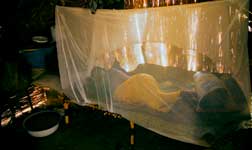Malaria solutions are available, Breman declares
May - June, 2009 | Volume 8, Issue 3

Photo courtesy of World Health Organization
Fogarty senior scientist Dr. Joel Breman, a world
expert on malaria, says understanding why using
bed nets, taking the proper medications and indoor
insecticide spraying can help people avoid the
disease.
Despite malaria's presence in more than 100 countries, there are scientific, logistical, financial and political solutions to its elimination, says Dr. Joel Breman, Fogarty's senior scientific adviser and a key figure in the recent history of infectious disease control.
The effort will take the provision of cheaper diagnostic tests and drugs, dedication of governments and the use of insecticide treated bed nets, Breman said in an online discussion of the disease just before World Malaria Day.
High-income countries have taken more interest in malaria recently, he said, because its control can lead to political stability and new foreign investment in a country.
"Communities at risk must participate in malaria programs - assuring compliance by taking their drugs, using and maintaining their bed nets, participating in spraying of houses and understanding why."
In addition to the necessity for political will in malarial countries and for low-cost diagnostic and therapeutic tools, Breman said it may be most important to train more malariologists and others in clinical, delivery, managerial, laboratory and research fields.
For individual families at risk, he suggested:
- Get, use and maintain long-lasting insecticide treated bed nets.
- Keep the compound and community free of breeding sites.
- Respond to any fever by seeing a health worker right away.
- Find out what the local government and nongovernmental organizations are doing and ask how community members can help them do a better job. If they are not doing anything demand that they do so.
Breman has trained, mentored and collaborated with scientists and public health workers in more than 20 countries in Africa in developing national malaria control policies, programs and guidelines.
To view Adobe PDF files,
download current, free accessible plug-ins from Adobe's website.